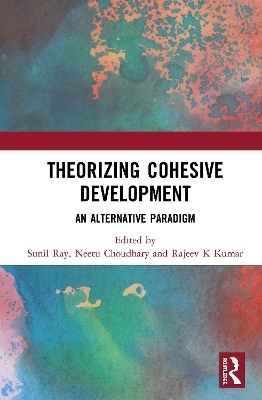
Theorizing Cohesive Development
Routledge India (Verlag)
978-1-138-58063-3 (ISBN)
This volume proposes an alternative development paradigm to the existing capitalist extant one, and studies how it is distinctly different from the older system. Rooted in the principles of solidarity between humans, as well as between humans and nature, this alternative paradigm replaces the methodological individualism of capitalism by ‘reciprocal altruism’, a new logic of capital, to give pace and direction to the development process.
The essays in this volume highlight instances of various forms of solidarity that have emerged in the contemporary world—such as resistance movements of informal workers, the formation of an autonomous cooperative of self-employed waste pickers in India, called SWaCH, and Brazil and Cuba’s experiments with Social and Solidarity Economy (SSE)—to achieve long sustaining cohesive development. They also provide recommendations as to how the State can mold its development process to the benefit of marginalized communities, especially in India and Bangladesh.
Featuring insights from leading experts in the field, Theorizing Cohesive Development will be an indispensable read for students and researchers of development studies, economics, political economy, political science and sociology, minority studies and Asian studies.
Sunil Ray is Professor of Economics. He was previously Director of A. N. Sinha Institute of Social Studies, Patna, India; Dean of School of Social Sciences and Head of the Centre for Economic Studies and Policy at the Central University of Bihar, India. He has been a visiting fellow at the Institute of Development Studies, Sussex, UK and Institute of Oriental Studies, Moscow, Russia. His papers have appeared in various national and international journals such as Economic and Political Weekly, International Journal of Ecological Economics, Asian Survey, Saving & Development, Capitalism Nature and Socialism. He has authored several books including Protection and Industrial Growth in India (1998), Natural resources Organization and Technology Linkages (1997) and Management of Natural resources–Institutions for Sustainable Livelihood (2008). Neetu Choudhary is Adjunct Faculty with the School of Human Evolution and Social Change, Arizona State University (ASU), USA. She was also Fulbright Fellow, 2018-19, at ASU. Prior to that, she was Assistant Professor of Economics with the A. N. Sinha Institute of Social Studies, Patna, India. She has worked and published considerably on issues of nutrition, gender and informal workers’ organizing. Rajeev K Kumar is Assistant Professor of Sociology and Social Anthropology at the A. N. Sinha Institute of Social Studies (ANSISS), Patna, India. His research focuses on tribal development and public health issues. Prior to joining ANSISS, he was Assistant Professor at International Institute of Health Management Research, Jaipur, India, where he worked on numerous projects on public health and was also Assistant Editor of the Journal of Health Management. He is the author of one book and several research papers and articles.
1. Introduction: Cohesive Development as an Alternative Development Paradigm 2. Cohesive Development: Forging theoretical space for Alternative Paradigm 3. Enemies of Cohesive Development 4. The Power of Audibility: Contestation and Communication as a Route to Cohesive Development 5. A Genuine Social Democracy – The Only Way! 6. Re-Imagining Socialism for the 21st Century: Cuba’s Experiments with Cooperativism and Solidarity Economies 7. Territorial Development and Social and Solidarity Economy in Brazil: Some Contributions to Cohesive Development 8. Tracing Cohesive Development: From Practice to Theory: Experience in Maharashtra 9. Towards Developing the Theoretical Perspective of Cohesive Development 10. Formal, Informal, Social and Unsocial Economy: Waste and the Work and Politics of Women 11. Integrating the Informal with the Formal: A Case of Cohesive Development in Urban Waste Chains 12. Organizing among Informal Workers: Can Pragmatism Invoke Cohesive Development? 13. Does Community-Driven Development (CDD) Empower the Powerless: The Case of Urban Bangladesh 14. Neo-Community Formation, Contestation and Policy Making in India: Narratives from Chilik 15. Community Network for Cohesive Development among Rural India: An Exploratory Study 16. Implementation of the Forest Right Act 2006 and its implications for Cohesive Development: The Case of Telangana and Andhra Pradesh
| Erscheinungsdatum | 02.07.2020 |
|---|---|
| Zusatzinfo | 4 Tables, black and white |
| Verlagsort | London |
| Sprache | englisch |
| Maße | 156 x 234 mm |
| Gewicht | 453 g |
| Themenwelt | Sozialwissenschaften ► Soziologie ► Spezielle Soziologien |
| ISBN-10 | 1-138-58063-5 / 1138580635 |
| ISBN-13 | 978-1-138-58063-3 / 9781138580633 |
| Zustand | Neuware |
| Haben Sie eine Frage zum Produkt? |
aus dem Bereich


